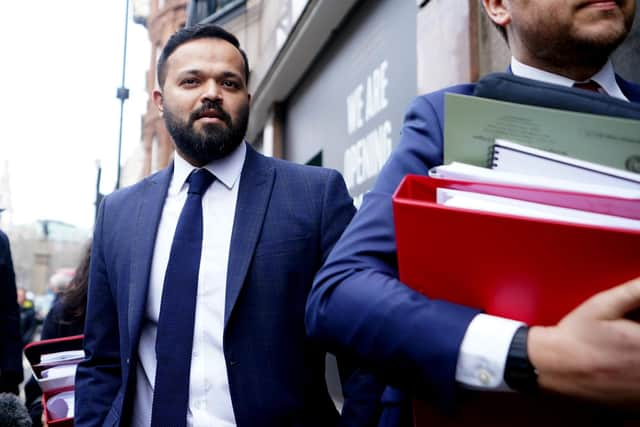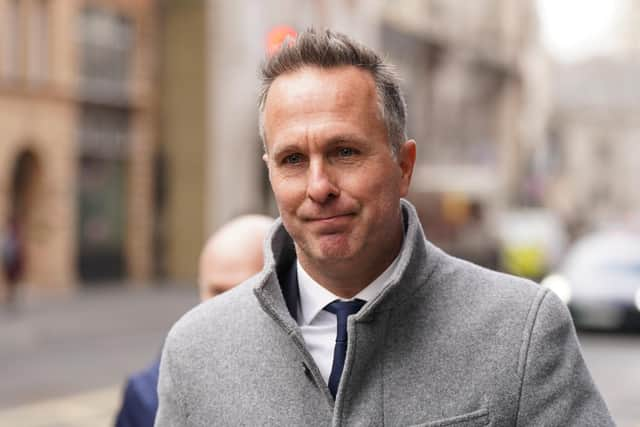What is Rafiq versus Vaughan really doing for the fight against racism? Chris Waters comment
On reflection, it had to be the whisky as a grimly compelling spectacle played out in real time.
Whether it was the 2005 Ashes-winning captain Michael Vaughan fighting to clear his name at the International Arbitration Centre in Fleet Street over an alleged comment made 14 years ago, or the current Yorkshire leg-spinner Adil Rashid supporting Azeem Rafiq’s allegation that Vaughan did say the words via a videolink from the England team hotel in Bangladesh, perhaps the most pertinent question did not crop up during cross-examination.
Advertisement
Hide AdAdvertisement
Hide AdNamely, what is any of this doing for cricket and the fight against racism?


Not much from where I’m tapping away.
A quick recap of why everyone was present on day two of the Cricket Discipline Commission hearing - the bloggers, the cameramen, the cricketers past and present.
They were there to see Vaughan - the only one of the seven individuals charged by the England and Wales Cricket Board to engage with a public process that has been heavily criticised - defend himself against the specific charge that he said to Rafiq, Rashid, Ajmal Shahzad and Rana Naved-ul-Hasan before a Yorkshire match at Nottingham in 2009: “There are too many of you lot, we need to have a word about it.”
When Rafiq made this allegation in 2020, he said that “no doubt it was disguised as banter; it wasn’t done in a malicious way”.


Advertisement
Hide AdAdvertisement
Hide AdUnder cross-examination from Vaughan’s legal team, Rashid described the remark as “a poor attempt at humour” and stressed that he was “not offended by it”; he also denied that he had been pressured by Rafiq into supporting the allegation.
Leaving aside for the moment the truth of the matter (Shahzad is adamant that Vaughan never said it and “wasn’t that way inclined”), and without wishing to downplay the nature of the allegation, is this really tackling racism in our society?
At best, the alleged words might even be claimed to have been a clumsy attempt at inclusion, an innocent if inappropriate means of bringing four new players into the fold, so to speak (it was the first time that all four had played together for Yorkshire).
At worst, as Rafiq and Rashid said, it was “disguised as banter” or “a poor attempt at humour”.
Advertisement
Hide AdAdvertisement
Hide AdEither way, it would suggest a need for education, mainly, as opposed to the sort of public flagellation that we are witnessing at present (so much of what we have heard during this entire saga, in fact, would appear to fall into that category, with no need for the hysterical witch-hunts favoured by some).
Kunwar Bansil, one of the staff sacked by Yorkshire for questioning Rafiq’s characterisation of the club and his so-called “one-man mission” to bring it down, put it best in my view when he told The Times last year: “My parents came from Punjab, India, and settled in Beeston, Leeds, first of all and then in Goole in East Yorkshire, a predominantly white, working-class area in the 1960s and 1970s.
“My parents have been abused, we’ve had our properties vandalised and windows smashed. I’ve heard the word P*** directed at me in an aggressive and offensive way. I have been involved in racist-fuelled confrontations. I know what racism is, what it feels like and what it smells like.” Bansil added that he was “never aware of any racism or complaints of racism during my time at the club”.
Set against Bansil’s experiences, which will sadly be common to many, the Vaughan allegation - which has pitted a former England captain against a current England player and a former England U-19 captain in Rafiq, in a very adversarial manner in public - seems to miss the bigger picture somewhat.
Advertisement
Hide AdAdvertisement
Hide AdIt reduces, in a very 21st-century way, everything to the cult of celebrity, to the high-profile names.
But is this what fighting racism should look like? Is this what it has been reduced to, in fact? An alleged remark made 14 years ago that can never be proved and which even a supporting witness did not find offensive?
Shortly, the Independent Commission for Equity in Cricket will publish its report and the game will come under yet more scrutiny.
By all accounts, cricket will admit that it is institutionally racist, while at the same time stressing that this doesn’t mean that everyone in cricket is racist. Eh?
Advertisement
Hide AdAdvertisement
Hide AdThe intention might be good but is this sort of guilt trip helpful? Is not the real need simply for education, for better awareness of equality and diversity?
Above all, is watching Vaughan versus Rafiq/Rashid over an alleged comment made 14 years ago, in a different era practically, advancing the cause? The problem, surely, is far greater than that.